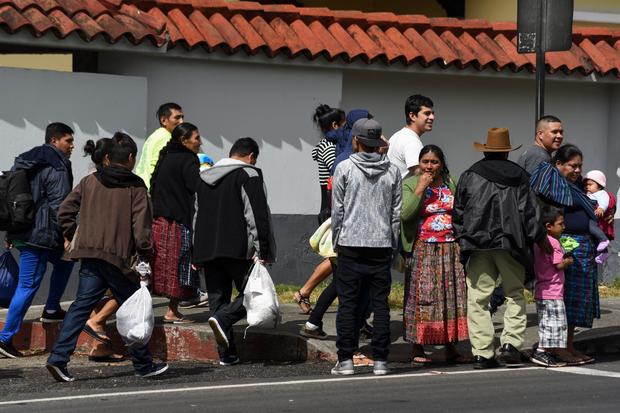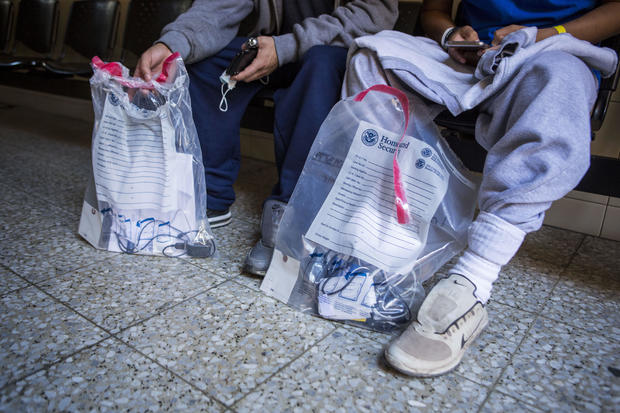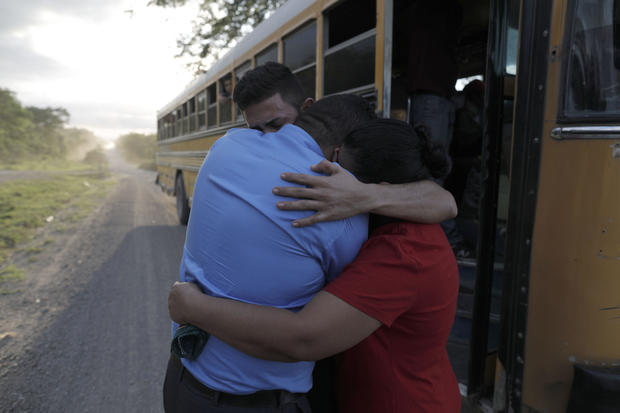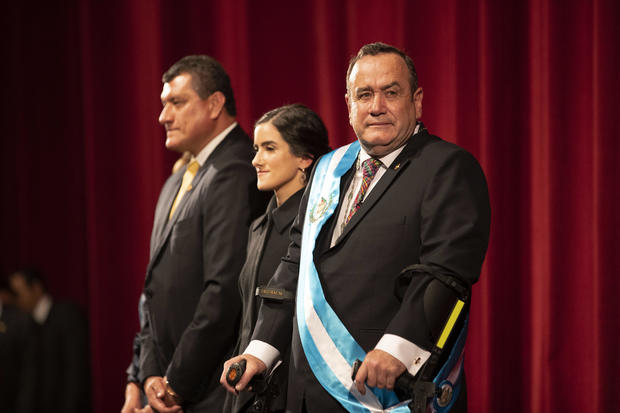Washington — The American Civil Liberties Union on Wednesday mounted the first legal challenge against the Trump administration’s policy of sending migrants who seek protection at the U.S.-Mexico border to Guatemala, a country with a skeletal asylum regime that has seen an exodus of hundreds of thousands of its own citizens in the past two years because of extreme poverty and endemic violence.
The lawsuit filed in the U.S. District Court in Washington, D.C., seeks to halt the implementation of a controversial asylum agreement with the Guatemalan government. Under the deal forged last summer, the U.S. has sent more than 150 asylum-seekers from Honduras and El Salvador to Guatemala, denying them access to America’s asylum system and requiring them to choose between seeking refuge in the Central American country or returning home.
The agreement, the ACLU said in its 54-page complaint, amounts to “a deadly game of musical chairs that leaves many desperate asylum-seekers without a safe haven, in violation of U.S. and international law.”
“If this rule remains in effect, it means that the U.S. can completely wash their hands of any responsibility to provide safe haven for people fleeing persecution,” Lee Gelernt, the ACLU’s top immigration litigator, told CBS News. “It would end asylum at the southern border, plain and simple.”
A spokesperson for the Department of Homeland Security told CBS News that while it cannot comment on litigation, “the U.S. Government and the Government of Guatemala remain committed to the asylum cooperative agreement and stand behind the integrity of the program.”
For lead plaintiff, returning home isn’t an option
As of last week, 158 Honduran and Salvadoran migrants have been rerouted by the U.S. to Guatemala, including dozens of families and at least 43 children, according to the Guatemalan migration institute. Nine people initially chose to request protection in Guatemala, but five of them have since abandoned their claims, the institute said. The rest have asked for help returning to their home countries.
The lead plaintiff in the ACLU’s lawsuit is a gay man from El Salvador who was sent by the U.S. to Guatemala after asking for asylum at the southern border. The man, identified only by the initials U.T., says he was sexually abused as a child, disowned by his family because of his sexuality and threatened by a gang member who solicited him for sex in El Salvador.
When he arrived at the U.S.-Mexico border, he was told he would be sent to Guatemala. He told Customs and Border Protection (CBP) officials, who make the initial determination about whether migrants should be subject to the U.S.-Guatemala deal, that he feared being sent to Guatemala. His concerns fell on deaf ears.
He was then referred for an interview with an asylum officer and again expressed fear of persecution in Guatemala. Nonetheless, he was deported to the country shortly afterward.
During these types of interviews, migrants must affirmatively say they fear being sent to Guatemala. Even if they do, they have to meet a fear of persecution threshold that is much higher than that of the typical “credible fear” interviews most asylum-seekers at the southern border are subject to.
The ACLU says the man applied for asylum once in Guatemala, but officials there advised him to seek protection in Mexico instead, since Guatemala is “unsafe for gay people.” The State Department warns of “societal discrimination” and police abuse against LGBTI people in Guatemala.
Returning to El Salvador is not an option for the asylum-seeker, who is currently in Mexico, since he “fears that he will be attacked or killed for his sexual orientation if he tries to live openly as a gay man,” according to the ACLU.
“A way for the U.S. to simply pass the buck”
There are five other individual plaintiffs in the ACLU’s lawsuit, including a woman and two families who were sent to Guatemala by the U.S. The Tahirih Justice Center and Las Americas Immigrant Advocacy Center, two organizations that provide legal services to asylum-seekers, are also named as plaintiffs in the lawsuit — which the National Immigrant Justice Center, Center for Gender & Refugee Studies and Human Rights First joined the ACLU in filing.
The group is asking the court to prohibit officials from enforcing a regulation the administration unveiled in November to implement the Guatemala deal and similar agreements that the U.S. brokered with Honduras and El Salvador which have not yet been implemented. The suit also challenges a U.S. Citizenship and Immigration Services (USCIS) guidance document for asylum officers carrying out the agreement.
The ACLU alleged that both measures violate U.S. statutes designed to prevent officials from sending asylum-seekers to places where they may face persecution and that provide legal safeguards for migrants the government seeks to deport quickly. The group also said the policy violates administrative law, since the administration did not give the public a chance to comment on it and failed to provide “reasoned explanations” for dramatically changing the asylum system at the southern border.
The administration maintains that its agreements with Guatemala and the other countries in Central America’s Northern Triangle will foster the “distribution” of asylum claims among nations in the region and provide protection to migrants “closer to home.” But the ACLU says the so-called “Asylum Cooperative Agreements” represent a dramatic departure from the “safe third country” provision in U.S. law that the administration is using to defend their legality.
In 1996, President Bill Clinton signed into law an act that codified the “safe third country” concept, allowing the U.S. to enter into bilateral or multilateral agreements to send asylum-seekers to third countries, as long as the U.S. government made sure those asylum-seekers would not face persecution based on a protected ground under U.S. asylum law and would have access to a “full and fair” process to request protection in those nations.
Gelernt and his group believe the accords with Guatemala, El Salvador and Honduras violate this law because the countries do not have fully functioning asylum regimes, unlike Canada — the only nation which has an official “safe third country” agreement with the U.S.
“There is no way the administration can plausibly claim that Guatemala can provide a safe, fair and full asylum process. This administration has simply thumbed their nose at Congress,” Gelernt said, noting that Canada, a developed country with a robust asylum system, is a safe place for refugees.
“This is not a way to provide people with a fair asylum process but a way for the U.S. to simply pass the buck,” he added.
Guatemala has experienced moderate economic growth since the end of a bloody civil war in the 1990s, but it continues to grapple with high homicides rates, drug trafficking, political instability and widespread poverty, especially among its large indigenous communities in the Western highlands of the country. Only about 262 migrants sought refuge in Guatemala in 2018, according to the United Nations.
The ACLU also noted in its lawsuit that the Trump administration hasn’t publicly revealed any designations certifying that the Northern Triangle countries have the capacity to take in migrants rerouted there by the U.S., despite a requirement that such a certification be included in the government regulation to enforce the asylum agreements.
Sweeping implications for asylum-seekers
All three agreements the U.S. made last year suggest that they could grant the U.S. the power to reroute most asylum-seekers from any country in the world, barring a few exceptions, like unaccompanied children, to Central America. The ACLU underscored the sweeping nature of the deals in its suit, saying that in practice, the U.S. could send asylum-seekers from Afghanistan to one of the Northern Triangle countries, even if they did not travel through there to get to the U.S. southern border.
The administration believes it can include “all populations” in the agreements, and it recently announced it was planning to send Mexican asylum-seekers to Guatemala. The move sparked scathing criticism at home and abroad, with Mexico’s government objecting to the proposal.
Unlike migrants from Honduras and El Salvador, Mexican asylum-seekers do not travel through Guatemalan territory to reach the U.S.-Mexico border. A plan to subject Mexicans to the U.S.-Guatemala accord could, in practice, lead to the U.S. flying a Mexican asylum-seeker from Tijuana, San Diego’s neighboring city, some 1,500 miles away, asking her to seek protection in Guatemala.
How Guatemala continues to implement its “Asylum Cooperative Agreement” with the Trump administration will now be decided by conservative government of President Alejandro Giammattei, who took office on Tuesday.
The asylum agreements with countries in Central America are part of a series of policies the administration rolled out over the past year to restrict asylum at the U.S.-Mexico border. These also include a sweeping rule that renders most non-Mexican migrants ineligible for asylum and the Migrant Protection Protocols program, which has required more than 57,000 asylum-seekers from Central America to wait in dangerous Mexican border cities for the duration of their U.S. immigration proceedings.





